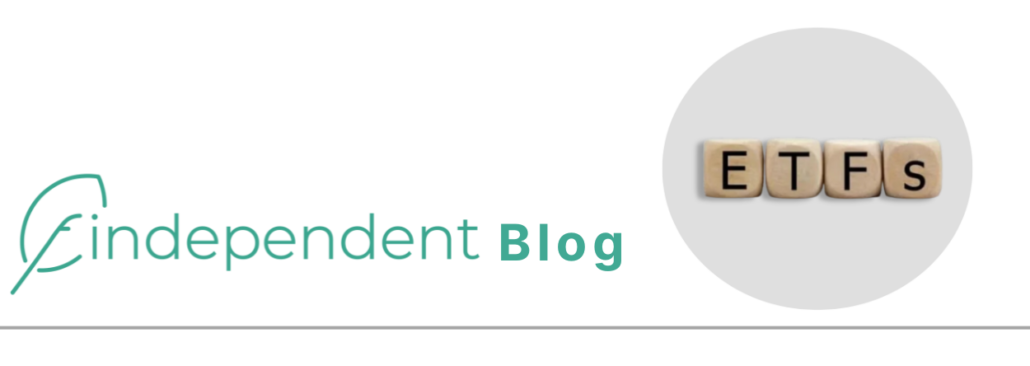
ETF (Exchange Traded Fund) simply explained
ETFs are very popular. Worldwide and also in Switzerland. An ETF is an exchange-traded fund that tracks an entire market, for example the Swiss stock market. They are a cost-effective and simple method of investing your money in a broadly diversified way. Even with small amounts and without prior knowledge.
In our article ETF simply explained, we talk about (probably almost) everything you need to know about ETFs.
ETF Definition: What is an ETF?
An ETF (“Exchange-Traded Fund”) is an exchange-traded fund that tracks the performance of an index. Investing in ETFs is becoming increasingly popular and you can, for example, easily invest in the entire Swiss stock market by buying an ETF that tracks the SPI (Swiss Performance Index). By investing in this ETF, you are effectively buying all Swiss equities. The ETF “iSharesSPI Core” CH0237935652 invests in all the shares included in the SPI and pools the money of many investors. When you buy a share of an ETF, a part of the ETF belongs to you and thus indirectly also a part of the shares bought by the ETF. However, the performance of the SPI is heavily dependent on Nestlé, Novartis and Roche, as together they account for roughly 50% of the SPI. A portfolio that contains only Swiss ETFs is therefore not really well diversified. Good geographical and sector diversification is therefore important for a broad-based investment.
findependent uses the SPI and 8 other ETFs for our findependent investment solutions. ETFs have the advantage that you can invest broadly already with small amounts and are therefore particularly well suited to start investing.
Are ETFs and funds the same thing?
No. A fund is not traded on the stock exchange. An ETF, on the other hand, is. So you can only trade a fund once a day, whereas you can buy an ETF all day long – provided the stock exchange is open (which is usually the case from 09:00 to 17:30).
Funds generally pursue an active trading strategy. They are therefore actively managed, which results in higher costs compared to an ETF.
At findependent, an ETF costs 0.1% to 0.2% per year, while at UBS a globally diversified active fund costs around 1.6%.
Investment funds from banks often also incur issuing or redemption commissions (up to 5%!).
ETF search, ETF comparison and ETF finder
You now know what ETFs are and now you want to choose the best ETFs for you, find the right ETF? The search for ETFs is not that easy, because the choice is huge. And the cheapest ETF is not always the best ETF. For the ETF search, the question “which ETF to buy”, there are numerous ETF finders where you can compare and find the different ETFs. In addition, there are a number of things to bear in mind when searching for an ETF:
- Broadly diversified
- Low total expense ratio TER
- Distribution or reinvestment of income
- Older than 1 year and at least CHF 100 million in volume
In the comparison of ETFs in Switzerland (ETF Switzerland comparison), it is important that you invest broadly in the entire market. Therefore, when searching for ETFs, you should make sure that you are not dependent on individual companies, sectors or countries. With the findependent investment solutions, 5 to 11 ETFs are used to adapt your ETF portfolio to your needs and to diversify it as broadly as possible. For your investment in ETFs, the initial deposit is CHF 500 so that we can invest your money in a diversified manner. With an investment amount of CHF 500 – 2’000 you hold 5 ETFs in your portfolio and from CHF 2’000 the number of ETFs is increased to 11. In this way, we make it possible for you to invest broadly in the entire market.
It is also important that investing pays off financially. Although ETFs are generally cheaper than actively managed funds, the product costs per ETF differ. The product fees can be compared with the Total Expense Ratio (TER). The TER is the annual cost of an ETF as a percentage. At findependent, when selecting an investment solution, we make sure that the fees are low so that there is more left over for you.
Use of earnings
A distinction is made between two different types of income allocation (dividends from equities, interest income from bonds – we call them “Obligationen” in Switzerland). There are distributing and accumulating ETFs. At findependent, we make sure to use reinvesting ETFs wherever possible. This means that the profit is reinvested and thus exchange rate costs as well as stock exchange and stamp duties are saved. For 4 ETFs that we use in our investment solutions, reinvestment is not (yet) possible. With distributing ETFs, the profit is distributed, as the name suggests, and dividends and interest income go directly into your account. When investing with findependent, we will reinvest the distributing income together with the next deposit. Whether you prefer accumulating or distributing ETFs depends entirely on your personal preferences.
Other important criteria for ETF comparison are how long an ETF has been around and how much money is invested in the ETF. The older an ETF is, the more data is available for comparison with other ETFs. ETFs that have not been in the market for long usually also have a lower fund volume. If the ETF is not in demand, there is a risk that the ETF could be liquidated at some point. It is therefore important to make sure that the ETF is older than 1 year and has a volume of more than CHF 100 million. In short, these are the most important criteria you should consider when buying an ETF. In our 4 tips you will also learn how to avoid the most common investment mistakes.
On the subject of income or dividends: By the way, there is also a kind of dividend ETF, this exchange traded fund invests exclusively in shares with high dividend yields. Of course, there are different providers and you should also compare ETFs here, as described above.
Taxes on ETFs in Switzerland
The tax implications of ETFs in Switzerland are manageable. This is particularly the case as a large proportion of the return is tax-free capital gains. The tax burden remains low, especially when compared to the long-term average return per year. You can find a more detailed explanation in our blog article “How are my investments with findependent taxed?”
Invest in ETFs with the investment app from findependent in Switzerland
So you see, investing money doesn’t have to be complicated. But how can you invest in ETFs in Switzerland? findependent offers you several options: with our ready-made investment solutions, you can confidently leave ETF trading to us and don’t have to worry about searching for ETFs. In addition to the ready-made investment solutions, you also have the option of putting together your own investment solution. Regardless of whether you prefer a ready-made solution or your own investment solution, findependent gives you complete flexibility and allows you to adjust your regular savings contributions at any time.
findependent helps
findependent takes care of the ETF search for you as we have selected 11 or 6 ETFs for you and put together five investment solutions to suit your investment profile. In order to invest broadly, we invest in equities, bonds and real estate. The distribution of equities is globally diversified in order to avoid heavy exposure to individual sectors. However, the focus remains on Switzerland with a distribution of 40 % Swiss equities and 60 % foreign equities. Investments in Swiss equities have tax advantages and avoid additional foreign currency costs. However, investing abroad achieves both geographical and sector diversification. For these reasons, the focus remains on Switzerland with a distribution of 40% Switzerland to 60% abroad. If the weighting does not suit your taste, you can also put together your own investment solution with a personal weighting of the individual ETFs.
Try the findependent investment app free of charge
You can try out our convenient investment solution for purchasing ETFs at your leisure, because findependent does not charge any fees on the first CHF 2,000 you invest in ETFs.
Scan and get started!

Download and get started!
Summary and conclusion
ETFs are no longer a passing trend and have become an integral part of investing. This is primarily because ETFs are a very cost-effective and simple way to make your money work for you. You can search for and buy ETFs yourself or delegate this task to an (usually digital) asset manager.
























